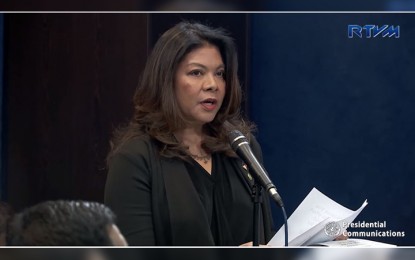
Former National Task Force to End Local Communist Armed Conflict (NTF-ELCAC) spokesperson Undersecretary Lorraine Marie Badoy (File photo)
MANILA – The Supreme Court (SC) has fined former National Task Force to End Local Communist Armed Conflict (NTF-ELCAC) spokesperson Undersecretary Lorraine Marie Badoy for indirect contempt for making online comments against a trial court judge who dismissed the government's petition to proscribe the Communist Party of the Philippines-New People’s Army (CPP-NPA) as a terrorist group.
Aside from the PHP30,000 fine, the SC also warned Badoy that a repetition of similar acts in the future shall merit a more severe sanction.
In a news release Thursday night, the SC said the SC en banc found Badoy guilty of indirect contempt of court for statements she made online attacking Manila Regional Trial Court Branch 19 Judge Marlo Magdoza-Malagar in September 2022.
The judge issued a resolution, dismissing the petition of the Justice department against the CPP-NPA.
In its ruling, the SC noted that Badoy’s assertion that Magdoza-Malagar's decision because of her supposed friendly ties with the CPP-NPA-National Democratic Front (NDF) threatens the impartial image of the judiciary.
It also ruled that Badoy failed to allege the existence of any qualified privilege that applied when she published her posts on Facebook.
It said that while "mere criticism or comment on the correctness or wrongness, soundness or unsoundness of the decision of the court in a pending case made in good faith may be tolerated", declarations such as those made by Badoy, ascribing improper motives to and rounding up public support to exert pressure on the judge, cannot be seen as criticism done in good faith.
"It is nothing but an act of intimidation to influence the resolution of a pending case,” the Court said.
The Court added that malicious imputations made even after the finality of a decision still fall under contemptuous speech if they tend to disrespect the court or create clear and present danger in the administration of justice.
It also found that Badoy’s “explosive statements” threatening to kill Judge Magdoza-Malagar and other judges were clearly made to incite Badoy’s followers and produce imminent lawless action, as evidenced by the multiple comments subsequently posted openly supporting the statements and even offering assistance.
The Court said Badoy’s statements jeopardized the judiciary by “sowing distrust and impairing the public’s confidence in the honesty, integrity, and impartiality of those donning judicial robes."
On Sept. 23, 2022, Badoy uploaded a public post on her Facebook page where she insulted the judge.
She also claimed that the judge was friends with the CPP-NPA-National Democratic Front (NDF) and that the judge “weaponiz[ed] a court of law to further inflict harm on a people that have long suffered the excesses and inhumanities of the CPP-NPA-NDF.”
Badoy also threatened to kill Magdoza-Malagar and further threatened to bomb the offices of whom she deemed as “friends of terrorists.”
The next day, Badoy uploaded another post, describing Magdoza-Malagar as “unprincipled and rotten” and claiming that the judge’s husband was a member of the CPP.
The Court warned online personalities and influencers, saying unregulated speech online and the spread of fake news pose real consequences in the real world.
“In a bid to ensure that their posts would become viral, they would make statements that produce heightened negative emotions, chasing after the dopamine rush brought about by the substantial increase in their followers and likes. The result is a proliferation of posts made to further their personal gain and popularity, without regard for the public good," it added.
It said freedom of expression " must never transgress the equally important aspects of democracy, not least of all the Judiciary’s dignity and authority". (PNA)
